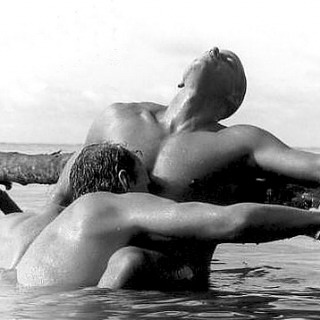 SALT LAKE CITY, UTAH - The specifics of their theology may differ, but gays and lesbians who struggle with their sexuality and look to their Judeo-Christian faith for help can find a wider variety of resources within their denominations — and in those of other faiths — than ever before, without the demand that they must change or be damned.
SALT LAKE CITY, UTAH - The specifics of their theology may differ, but gays and lesbians who struggle with their sexuality and look to their Judeo-Christian faith for help can find a wider variety of resources within their denominations — and in those of other faiths — than ever before, without the demand that they must change or be damned.According to officials with a local support network, that's particularly true for gay members of The Church of Jesus Christ of Latter-day Saints, several hundred of whom are expected to attend the final sessions of the 16th annual Evergreen International conference today at the Joseph Smith Memorial Building.
David Pruden, director of Evergreen, said his organization — which is not formally affiliated with the LDS Church but promotes its doctrines and standards — is one of several religious ministries across the country working to provide more resources for homosexuals and their family members.
Gender issue ministry for Latter-day Saints has evolved greatly in the past 16 years, he said. When he joined the organization a decade ago, there were only a couple of LDS therapists considered to be experts on the topic. Early on, organizers went to LDS Family Services for advice on resources and were told, "We don't know what to tell you," he said.
Consequently, the group took direction from the only experts they had, meaning the theories espoused by one or two counselors "probably had a disproportional influence" on what became the group's central focus at that time: "changing" people from homosexual to heterosexual, often with a heavy emphasis on the potential for eternal punishment rather than on coping with daily realities.
"In the early days, this thing was therapist-driven and (LDS) priesthood-driven," Pruden said. "When they set it up, they said, 'What do we do?' where the (church) doctrine says this and therapists believed this. The problem is, there were not a lot of people around who had actually dealt with it around," and those who were dealing with it weren't talking about it — particularly if they didn't feel they could change their orientation.
"The influence of people who have lived this has now grown, and they're moving into a longer time now of having been successful" at dealing with homosexual tendencies, even if they haven't seen them evaporate. "It doesn't just go away for everyone," even those who work at overcoming such feelings for years on end, he said.
"We've seen many of those people who are marrying, who have become bishops and stake presidents," and many of those who sought help early on "are now exerting themselves much more in the process" of reaching out to others with similar struggles through Evergreen, Pruden said. "It's no longer controlled by theoreticians" with no personal understanding of what is helpful and what isn't.
Top LDS leaders have advocated compassion more heavily in recent years, stating that those with homosexual tendencies may participate in the faith's most sacred ordinances if they live church standards, which prohibit homosexual behavior. A lengthy discussion on the topic by Elders Dallin H. Oaks and Lance B. Wickman was recently posted quietly in the "newsroom" section of the church's Web site — www.lds.org — under the tab "same gender attraction," though there was no indication of that posting on the main Web page itself.

Evergreen's goal now is for every person to be successful in dealing with their feelings while living LDS standards, Pruden said, whether that means eventually changing orientation or simply learning how to cope with unwanted homosexual tendencies.
That approach seems to fall in line with that of other large ministries whose focus has become one of compassion and providing resources, supporting the idea that a change in orientation is possible while recognizing that people will ultimately make their own lifestyle choices
Alan Chambers, president of Exodus International, told the Deseret Morning News on Thursday that his organization — dubbed the world's largest evangelical Christian ministry on gender issues — hears from thousands of clergy each year who are trying to "reach out with a compassionate heart to those who are hurting. Our message is you don't have to know a whole lot about homosexuality to reach out in compassion and kindness. All you have to do is have a heart for people, and we're seeing pastors in churches coming into that."
In years past, such ministries were "afraid to give any credence toward the argument that (homosexuality) could be genetic. Today, we don't think there is any harm in saying we're genetically made people — it's something that factors into our development."
While Chambers believes scientists may one day find a conclusive link between genetics and homosexuality, "in my opinion, that will never be something that forces someone to be gay or straight. Far more goes into it than just that," including developmental and psychological factors that have already been definitively linked to sexual orientation.
Chambers, who said he overcame his own unwanted homosexuality, was Evergreen's keynote speaker on Friday. He believes that no matter how sexual orientation develops, "the fact is people who are highly motivated and want to find a way out can. ... Often activists try to prove that people can't change, and on the other side you have some Christian ministries trying to derail the genetic argument.
"We need to come to some common ground. People have the right to choose how they want to live their lives. I didn't choose to feel gay, but I did choose to overcome it," he said. "I think it's important to support what science brings about. And if a scientific link to genetics is proven someday, that doesn't mean we can't change."
from Deseret News
No comments:
Post a Comment